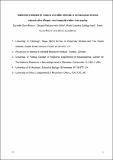Files in this item
Alzheimer's disease in humans and other animals : a consequence of postreproductive life span and longevity rather than aging
Item metadata
| dc.contributor.author | Gunn-Moore, Danielle | |
| dc.contributor.author | Kaidanovich-Beilin, Oksana | |
| dc.contributor.author | Gallego Iradi, Maria Carolina | |
| dc.contributor.author | Gunn-Moore, Frank | |
| dc.contributor.author | Lovestone, Simon | |
| dc.date.accessioned | 2018-09-29T23:54:33Z | |
| dc.date.available | 2018-09-29T23:54:33Z | |
| dc.date.issued | 2018-02 | |
| dc.identifier | 251063486 | |
| dc.identifier | 8b562d3d-7fd3-4f74-be5c-2bd976386018 | |
| dc.identifier | 85031907092 | |
| dc.identifier | 000424405500009 | |
| dc.identifier.citation | Gunn-Moore , D , Kaidanovich-Beilin , O , Gallego Iradi , M C , Gunn-Moore , F & Lovestone , S 2018 , ' Alzheimer's disease in humans and other animals : a consequence of postreproductive life span and longevity rather than aging ' , Alzheimer's and Dementia , vol. 14 , no. 2 , pp. 195-204 . https://doi.org/10.1016/j.jalz.2017.08.014 | en |
| dc.identifier.issn | 1552-5260 | |
| dc.identifier.other | ORCID: /0000-0003-3422-3387/work/37446775 | |
| dc.identifier.uri | https://hdl.handle.net/10023/16109 | |
| dc.description | Research in the author’s laboratories is supported by the NIHR, MRC, ARUK, Alzheimer’s Society, Wellcome Trust and the EU | en |
| dc.description.abstract | Introduction Alzheimer's disease and diabetes mellitus are linked by epidemiology, genetics, and molecular pathogenesis. They may also be linked by the remarkable observation that insulin signaling sets the limits on longevity. In worms, flies, and mice, disrupting insulin signaling increases life span leading to speculation that caloric restriction might extend life span in man. It is our contention that man is already a long-lived organism, specifically with a remarkably high postfertility life span, and that it is this that results in the prevalence of Alzheimer's disease and diabetes. Methods We review evidence for this hypothesis that carries specific predictions including that other animals with exceptionally long postreproductive life span will have increased risk of both diabetes and Alzheimer's disease. Results and Conclusions We present novel evidence that Dolphin, like man, an animal with exceptional longevity, might be one of the very few natural models of Alzheimer's disease. | |
| dc.format.extent | 598389 | |
| dc.language.iso | eng | |
| dc.relation.ispartof | Alzheimer's and Dementia | en |
| dc.subject | Longevity | en |
| dc.subject | Insulin signaling | en |
| dc.subject | Alzheimer's pathology | en |
| dc.subject | Animal models | en |
| dc.subject | Tau | en |
| dc.subject | Amyloid | en |
| dc.subject | GSK-3 | en |
| dc.subject | QH301 Biology | en |
| dc.subject | QH426 Genetics | en |
| dc.subject | RC0321 Neuroscience. Biological psychiatry. Neuropsychiatry | en |
| dc.subject | T-NDAS | en |
| dc.subject | SDG 3 - Good Health and Well-being | en |
| dc.subject.lcc | QH301 | en |
| dc.subject.lcc | QH426 | en |
| dc.subject.lcc | RC0321 | en |
| dc.title | Alzheimer's disease in humans and other animals : a consequence of postreproductive life span and longevity rather than aging | en |
| dc.type | Journal article | en |
| dc.contributor.institution | University of St Andrews. School of Biology | en |
| dc.contributor.institution | University of St Andrews. Institute of Behavioural and Neural Sciences | en |
| dc.contributor.institution | University of St Andrews. Biomedical Sciences Research Complex | en |
| dc.identifier.doi | 10.1016/j.jalz.2017.08.014 | |
| dc.description.status | Peer reviewed | en |
| dc.date.embargoedUntil | 2018-09-30 |
This item appears in the following Collection(s)
Items in the St Andrews Research Repository are protected by copyright, with all rights reserved, unless otherwise indicated.

